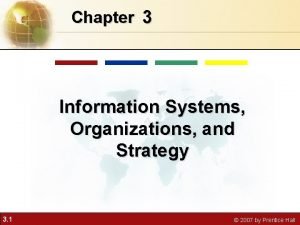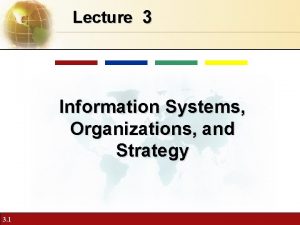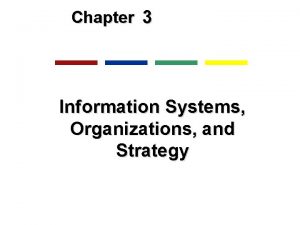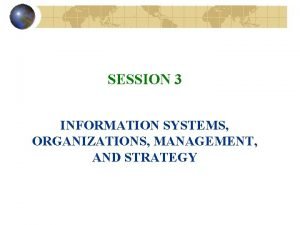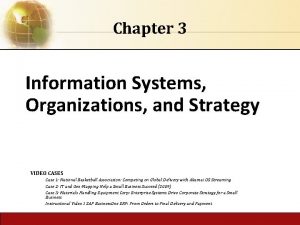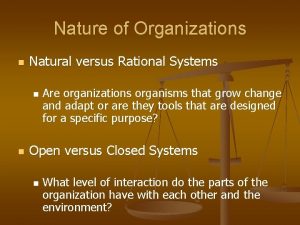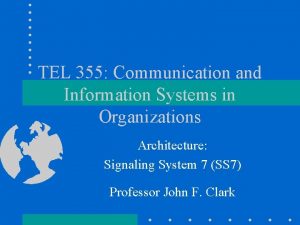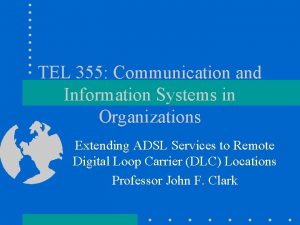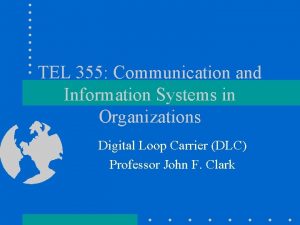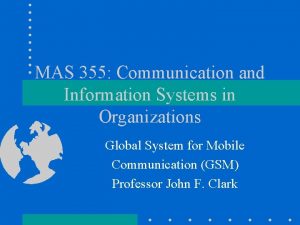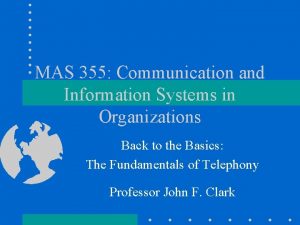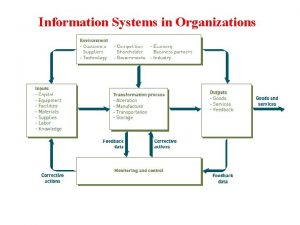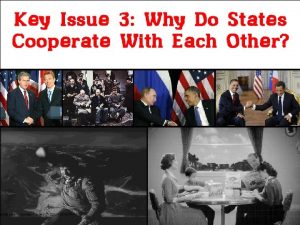TEL 355 Communication and Information Systems in Organizations












- Slides: 12

TEL 355: Communication and Information Systems in Organizations Understanding Managers’ Media Choices: A Symbolic Interactionist Perspective Professor John F. Clark

Importance of Communication • Communication is the primary process through which managers do their work. • Managers spend approximately 80% of their time communicating. • Managers have many personal and technological options for communicating. • Appropriate media choice can make the difference between effective and ineffective communication.

Examples: The Wrong Decision? • Senior managers of an international phone company couldn’t rely on the phone to meet with managers from other countries. • Mandated email communication doesn’t work for solving complex problems. • The wrong decisions for media choice at NASA have resulted in the deaths of two entire shuttle crews.

Symbolic Interactionism • A theoretical framework used to explain sociological and social psychological phenomena: society is communication. • The basis for interaction among members of an organization is a shared system of meaning. • Organization members look to each other for help in interpreting ill-defined situations.

Managerial Media Choices • There are three variables that affect managerial media choices: • The equivocality of the message, • Contextual determinants, • And the symbolic cues conveyed by the medium itself above and beyond the literal message.

Equivocality • Definition: the existence of multiple and conflicting interpretations about an organizational situation. • Equivocality is high when the message is ambiguous. • Unfortunately, for a number of reasons most high-level organizational decisions are made under conditions of ambiguity.

Rich vs. Lean Media • The continuum is based on four criteria: • The availability of instant feedback, • The capacity of the medium to transmit multiple cues, • The use of natural language to convey subtleties, • And the personal focus of the medium

Continuum: Rich to Lean Media • • • Face to face meetings Videoconferencing Telephone conversations E-mail Personal written documents Impersonal written documents

What Makes a Good Manager? • Good managers choose media based on the equivocality of the communication. • Ambiguous messages require face to face communication • One study found that 87% of “media sensitive” managers were rated as high performers. • Only 47% of “media insensitive” managers were rated as high performers.

Contextual Determinants • There are practical considerations that constrain media choices: • Expense – particularly travel • Geographical distance • Time pressures • Accessibility or availability of media • Critical mass of users

Symbolic Meaning • In symbolic interactionism, anything can be considered a symbol, or carrier of meaning. • A particular media choice may carry symbolic cues beyond the literal message. • These are interpretations based on cultural and subjective norms. • Managers use ritualistic media choices to appear competent, intelligent, legitimate, and rational.

Guideline for Managers • Send equivocal messages through a rich medium. • Send unequivocal messages through a lean medium. • Be a critical receiver. • Use the medium for it symbolic message. • Evaluate new communication technology carefully.
 Information systems organizations and strategy
Information systems organizations and strategy Information systems, organizations, and strategy
Information systems, organizations, and strategy Information systems, organizations, and strategy
Information systems, organizations, and strategy Information systems organizations and strategy
Information systems organizations and strategy Chapter 3 information systems organizations and strategy
Chapter 3 information systems organizations and strategy Information systems and communication technologies quiz
Information systems and communication technologies quiz Natural vs rational systems
Natural vs rational systems Iat
Iat Sentencia c-355 de 2006
Sentencia c-355 de 2006 Sanglier turquie record
Sanglier turquie record Sentencia c-355 de 2006 imagenes
Sentencia c-355 de 2006 imagenes Yesus memanggil kj 355
Yesus memanggil kj 355 Csce 355
Csce 355
